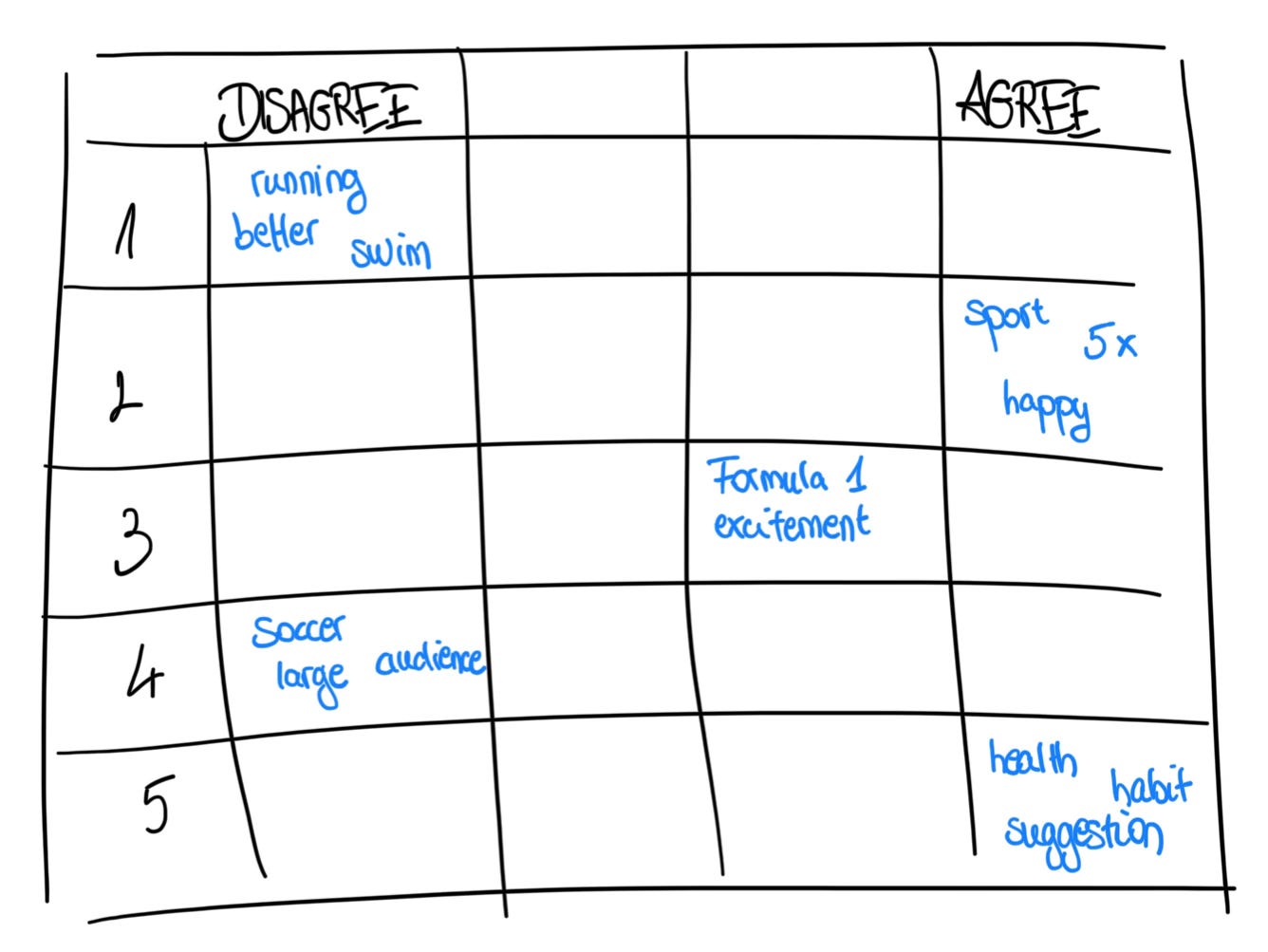Activities that Save the Day!
My go-to activity types when I have no idea what to do in class.
There are some activity types that you can always trust, especially if you're tired, overworked, (can’t be bothered), or just forgot to plan. These low-prep tasks not only improve several skills at once but will also save the day (and your lesson) for sure!
0. Planning essentials
Something to already jot down on your running order are two/three important stages of the lesson. One tends to get way too much spotlight, while the other is usually completely forgotten. I’m talking about warmers, lead-ins, and coolers (or reflection stages).
Warmers as energy meters
Every lesson is better with a warmer, which basically helps students feel at ease in your lesson, in your space. This is when you can connect to them a bit and gauge their energy levels by asking a couple of questions about how they are. Try to make this short stage genuine and meaningful, and do listen to what your students have to say.
Keep lead-ins short and to-the-point
A lead-in then, as the name suggests, leads students to the next stage, which is the main activity. Again, don’t forget this stage because it makes the lesson flow naturally without any abrupt changes. Lead-ins usually start from a wider perspective: they pose general questions in connection with the topic or they introduce words that are probably new but important for the task. But don’t make them too long. They’re there to support, not to take the main stage.
Coolers are more than just a “goodbye”
This happens to me almost every single time no matter how many blog posts or lecture slides I write about the importance of coolers: I simply forget about them. I get so caught up in the moment that this stage completely slips my mind. But a cooler or reflection stage has a good reason to be in your lesson. They let students calm down, take stock of what they’ve learned, and retain new information a bit longer than 10 seconds.
And with these stages, you already have about 15 minutes from a 45-minute lesson! Now let’s see the my go-to main activity types!
1. Variations on dictation
Dictation can be great to improve multiple skills at once. It activates listening skills, memory, writing skills (including spelling, coherence, and cohesion), reading skills (=making sense of what you’ve written), and speaking skills.
Opinion dictation
The way I’ve learned to play this game is:
Ask students to draw a table like the one below. Make sure the cells are big enough to write in.
Tell students that they’re going to hear a number of statements twice. They need to decide how much they agree with these statements. They should note down maximum 3 key words from the statements and put those key words into a box on the disagree-agree scale. They cannot write complete phrases or sentences.
Once you’ve read out the statements, put students in pairs or small groups and ask them to try and reconstruct the statements from the words they have written down. They should try and make them sound as much like the original ones as possible.
When they think they have the statements, ask them to discuss why they decided to agree or disagree with them.
Finally, check the statements in open class by asking students to read out their versions. Let them argue about various ways of phrasing the statements before showing them the actual sentences.
Variation: You can also have students prepare and read out sentences to each other in smaller groups.
Running dictation
You will need a text that you cut up into shorter sections. These should be around 1-2 sentences long.
Place these cards around the room. Make sure they’re not easy to read from a distance.
Put students into pairs. One of them will be the scribe, while the other is the runner. They can switch at half time.
Runners will have to run around the room, read what’s on the cards, try and remember as much as possible, run back to their pairs, and dictate everything they can remember. It’s important that they cannot shout across the room.
Scribes have to write down whatever they get from the runners. They can ask for clarification.
Once the pairs are done, they can sit down and start making sense of the sentences they’ve written down. They need to make sure the text makes sense, everything’s spelled correctly and is grammatically correct.
Give them or show them the original text to let them double check.
Ask additional opinion or language-related questions to follow up the text they’ve just worked with.
Dictogloss
This is another complex favourite. Ask students to work in pairs or groups.
You read out a text two or three times and ask students not to write down anything but listen closely.
When you’re done, ask students to try and reconstruct the text from memory.
The point is not to get the exact copy of the text but something that resembles it as much as possible. What you’re actually doing with this activity is that you make students focus on the meaning of new expressions or a new grammar point rather than on the form or the rule. They’re probably not going to remember the new items but they might understand how they’re used. So they’re probably going to end up with synonymous expressions instead.
When students are done, give them the text in a printed format. Ask them to compare their versions with the original, and highlight anything that’s new or different.
Follow up this part by asking them what they think the highlighted parts mean and what the rules are. This can then lead into a vocabulary or grammar-focused lesson.
2. Pyramid discussion
This is basically a simple speaking activity that can go on forever 😄. Another name for it is “snowball discussion.”
You will need something that needs to be organised or agreed on, like a birthday party, office restructuring, school renewal, what to bring on a desert island etc.
Ask students to work in pairs and come up with a number of ideas (let’s say 5) for organising whatever needs to be organised. Give them 5-ish minutes.
When they’re done, put two pairs together, and ask them to share their ideas with each other. Make sure to ask them to agree on a limited number of ideas (6 or 7). Which means they will have to agree, compromise, and reduce their 10 ideas to fewer.
When they’re done, put two groups of 4 together, and repeat the previous stage. More ideas, more arguments, more negotiations follow. And this could basically go on forever or until you run out of students.
When your entire group is now taking part in the discussion, you can still introduce further cuts to the number of ideas by having them vote on certain things. The aim is to arrive at a final idea, plan, or list. Ask students to summarise the final solution bit by bit one by one.
3. Alibi game
Such a classic! The alibi game is basically the best example of a communicative task, which means that it creates an authentic and genuine need to communicate, there is some kind of information gap that needs to be bridged, and students can rely on whatever linguistic resources they have to solve the task (so they’re technically not required to use a specific tense).
Put students into two groups, Detectives and Criminals. Or, alternatively, select just a few (maximum 4 students) students to be criminals.
The context is that some kind of crime (you decide) was committed the previous day. Detectives need to find the culprits, while Criminals have to craft the best alibi that no detective can break.
Ask the Criminals to step outside of the classroom (if possible) to create their bulletproof alibi. At the same time ask the Detectives to come up with a list of good and cunning questions that could catch the Criminals.
Ask the Criminals to come back. Create two mixed groups: a number of Detectives with a couple of Criminals twice.
Let the Detectives interview (=roast) the Criminals for about 10 minutes. If you have time, you can also ask the Criminals to switch between the two Detective teams and have another round of an interview.
Once the interviews are over, ask the Detectives whether they have found any convincing evidence that the Criminals committed the crime. If their arguments don’t match up logically, they have failed and the Criminals have won. But if the Criminals have been telling different stories and their alibis don’t match up, they have lost.
Let me know what your favourite go-to activities are in the comments!
Sources and further reading
Methodology: using dictation in English language teaching by Tim Bowen
Running classroom dictation activity by Anthony Tyrrell
101 low-prep ideas for exploiting coursebook activities by Sandy Millin
Three Low Prep Ideas to Liven Up Your Class by Jo Gakonga
Adapting the alibi game by Mike Astbury




